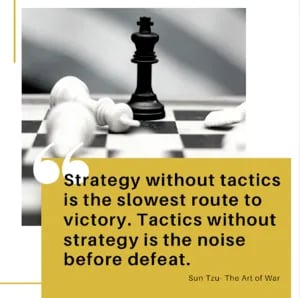Law firms use strategic planning to look toward the future and its goals and to outline a process for getting there. Working with many law firms, we see some firms take an uninspired approach to strategic planning. They spend a lot of time creating the plan, but it ends up collecting dust on a shelf and never getting implemented.
Other firms indicate that they don't need a formal strategic plan to be successful. And while these firms may have had some success without a plan in place to guide them, we can only wonder about the results they could have achieved with an effective strategic plan.
Could your law firm be more profitable?
More competitive?
More attractive to clients and to lateral attorneys?
And how can you be sure that what your firm is doing now will continue to work in the future?
Rather than leaving things up to chance or wasting time developing unproductive initiatives, when strong efforts are put into strategic planning for law firms, long-term success is usually the result.
If your law firm is experiencing any of the following warning signs, poor strategic planning could be the cause:
1. Hit or Miss Successes
Consistent performance is not an accident. And while strategic planning does not guarantee success, it helps guide decision-making, anticipates change, and identifies opportunities, which all lead to better long-term performance. Most firms struggling with consistency don't have a planning process or don't adhere to plans when formed.
There are a lot of firms that view each year as a sprint to December 31st and gauge success by the cash that flows through to the equity owners. Firms suffering from a weak planning effort rarely connect one year to the next. Few firms think in terms of 3 or 5 years.
2. Absent Processes
Coherent strategic plans rarely occur without a process. Equity owners and managers may think strategically about their practice or about their area, but absent a process, ideas are rarely coordinated into a firm plan.
When firms lack planning processes, different groups and factions can form and actually work at odds. Opportunities are missed due to an insufficient understanding of what others in the firm are trying to accomplish.
3. Unclear Vision of the Future
Having nothing concrete to work toward, important decisions tend to favor expedience and short-term profit. Decisions that span over longer periods (years) often miss the mark. For example, office space decisions that fail to anticipate long term needs often result in a firm having too much or too little room.
Rather than making decisions on a rational analysis of projected needs, the deal from the landlord is given more weight. A clear future vision will help guide these decisions and ensure the appropriate priorities are considered in the proper proportions.
4. Resistance to Change
Firms that are resistant to change typically have weak planning processes. As the preferred mindset is that change is not inevitable, planning tends to only account for changes in existing factors.
For example, a lawyer is planning to retire in the next year or a client might reduce the existing workflow. Change resistant firms will fail to consider these most basic disruptions (denial), and rarely execute proactive moves to improve the processes, technology, or competency of their workforce.
In our experience, most firms can create significant improvements, but must first find a way to deal with their fear of the unknown.
5. Lack of Market Awareness
A sincere planning process requires a firm to objectively consider the supply side (competitors) of the market they serve and the factors that affect demand (clients) in that market. Firms sometimes tell us that they don’t pay attention to their competitors because “they just do it their way”.
We see an oversimplification of this process as a mistake. Not knowing the main factors of competition in your markets often give you the false belief that your approach is somehow superior, even when competitors hold market leadership.
Not knowing the less obvious factors that impact your clients’ need for your services (demand) is a good way to end up with no business.
6. Unclear Goals

The most formidable challenge of a weak strategic planning effort is insufficient clear goals. In general, weak firms struggle with frustrated equity owners, attorneys, and staff who have no idea of the direction the firm is going. Management is often incoherent and tends to respond to the day's mood. Institutional loyalty suffers and is replaced with individual loyalties. When this happens, the firm splinters and internal competition (the most debilitating of factors) grows.
A solid strategic planning process gives clear direction and goals. It illuminates the benefits of collaboration and shared opportunities, enhancing the likelihood that the culture itself will support productive behaviors.
If any of these symptoms sound familiar to your firm, a more effective strategic planning effort is recommended. PerformLaw can help you implement effective processes to help you avoid the frustrations and wasted time related to poorly planned initiatives.
.webp?width=124&height=108&name=PerformLaw_Logo_Experts3%20(1).webp)


